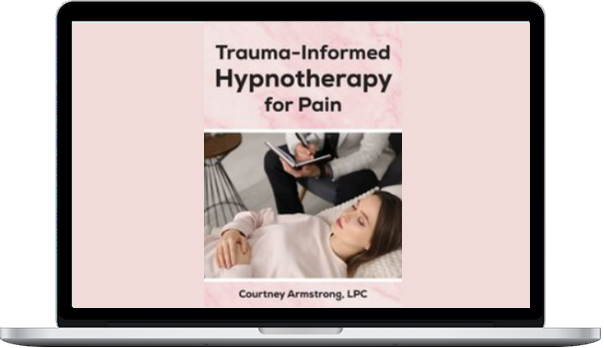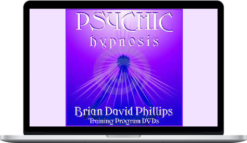Courtney Armstrong – Trauma-Informed Hypnotherapy for Pain
$129.00 $39.00
Total Sold: 1
»Instant Delivery
Description
Courtney Armstrong – Trauma-Informed Hypnotherapy For Pain
- Trauma-Informed Hypnotherapy for Pain
- Hypnosis Protocols to Relieve Chronic Pain & Enhance Trauma Treatment
- Speaker: Courtney Armstrong, LPC, MHSP
- Duration: 2 Hours 05 Minutes
- Format: Audio and Video
Description Of Trauma-Informed Hypnotherapy For Pain
Trauma doesn’t just leave behind emotional pain– it can also manifest as physical pain in the form of headaches, pelvic pain, back pain, fibromyalgia, and irritable bowel syndrome. These conditions often baffle doctors and leave clients feeling even more helpless and hopeless. Clinical hypnosis can be a highly effective tool for relieving pain in trauma survivors. Learn a trauma-informed approach you can use to safely elicit hypnosis; apply techniques to relieve pain and restore an internal sense of safety; and create a greater sense well-being and empowerment in your clients. You may even experience your own transformative trance with demonstrations and activities that show you how to:
- Safely guide clients into hypnotic states and effectively frame suggestions
- Use hypnotic techniques that increase feelings of safety and comfort in the body
- Create hypnotic suggestions to instill hope, relieve pain, and empower clients
- Resolve subconscious beliefs that may be maintaining pain responses
What You’ll Learn In Trauma-Informed Hypnotherapy For Pain
Objectives
- Discuss how traumatic experiences can contribute to the development of neuroplastic pain.
- Summarize scientific theories about how hypnosis works and can be used to relieve chronic pain and enhance trauma treatment.
- Identify three types of hypnotic suggestions that can be used to reduce pain and promote a positive post-trauma identity
Outline
Trauma and Neuroplastic Pain Research
- Prevalence of co-occurring PTSD, complex trauma and chronic pain symptoms
- Phenomena of neuroplastic pain and promising new treatment approaches such as Pain Reprocessing Therapy
- Mark Jensen’s research on pain perception in the brain and how hypnosis can be used to alter pain perception.
Hypnosis to Calm Anxiety, Relieve Pain, and Elicit Positive Emotional States
- Two definitions of clinical hypnosis
- The myths and misconceptions of hypnosis.
- Hypnosis theories that explain the mechanisms in the brain and the interpersonal dynamics
- Hypnosis as an adjunct to cognitive-behavioral treatment for pain, anxiety, and trauma
- Special considerations with trauma survivors and how to adapt inductions and safely re-alert clients to avoid abreactions
Hypnosis Demonstrations: Increase feelings of safety and comfort in the body
Hypnotic Techniques for Pain Reduction and Positive Post-Trauma Identity
- Increase comfort and decreasing unpleasantness
- Explore emotional associations with pain symptoms
- Increase self-compassion, internal safety, and empowerment
Target Audience
- Psychologists
- Counselors
- Social Workers
- Marriage and Family Therapists
- Addiction Counselors
- Nurses
- Physicians
- Other Mental Health Professionals
About Courtney Armstrong, LPC, MHSP
Courtney Armstrong, LPC, MHSP, is the founder of the Institute for Trauma Informed Hypnotherapy and author of Rethinking Trauma Treatment: Attachment, Memory Reconsolidation, and Resilience. She has over 25 years’ experience and is a board-certified Fellow in clinical hypnotherapy who has trained thousands of mental health professionals nationally and internationally in creative, brain-based strategies for healing trauma.
She is a bestselling author of the book, The Therapeutic “Aha!”: 10 Strategies for Getting Clients Unstuck and Transforming Traumatic Grief and contributes to publications such as Psychotherapy Networker, Counseling Today, and The Neuropsychotherapist. She has been featured as a trauma and grief expert on national television and radio programs and is the owner/director of Tamarisk: A Center for Mind-Body Therapy in the state of Tennessee.
Speaker Disclosures:
Financial: Courtney Armstrong is the founder and president of Courtney Armstrong Consulting and Training Services and the Institute for Trauma Informed Hypnotherapy. She is a consultant with the US Veterans Administration. Courtney Armstrong receives a speaking honorarium and recording royalties from PESI, Inc. She has no relevant financial relationships with ineligible organizations.
Non-financial: Courtney Armstrong serves on the Clinical Hypnosis Education and Training Committee of the American Society for Clinical Hypnosis. She is a member of the American Mental Health Counselor’s Association, the Tennessee Licensed Professional Counselors Association, and the Chattanooga Area Psychotherapy Association.
More courses from the same author: Courtney Armstrong
Delivery Policy
When will I receive my course?
You will receive a link to download your course immediately or within 1 to 21 days. It depends on the product you buy, so please read the short description of the product carefully before making a purchase.
How is my course delivered?
We share courses through Google Drive, so once your order is complete, you'll receive an invitation to view the course in your email.
To avoid any delay in delivery, please provide a Google mail and enter your email address correctly in the Checkout Page.
In case you submit a wrong email address, please contact us to resend the course to the correct email.
How do I check status of my order?
Please log in to HealingCourse account then go to Order Page. You will find all your orders includes number, date, status and total price.
If the status is Processing: Your course is being uploaded. Please be patient and wait for us to complete your order. If your order has multiple courses and one of them has not been updated with the download link, the status of the order is also Processing.
If the status is Completed: Your course is ready for immediate download. Click "VIEW" to view details and download the course.
Where can I find my course?
Once your order is complete, a link to download the course will automatically be sent to your email.
You can also get the download link by logging into your HealingCourse account then going to Downloads Page.

![Introduction to N-Tone Chanting Method [Recordings Only]](https://healingcourse.net/wp-content/uploads/2025/01/Introduction-to-N-Tone-Chanting-Method-Recordings-Only-100x100.png)





